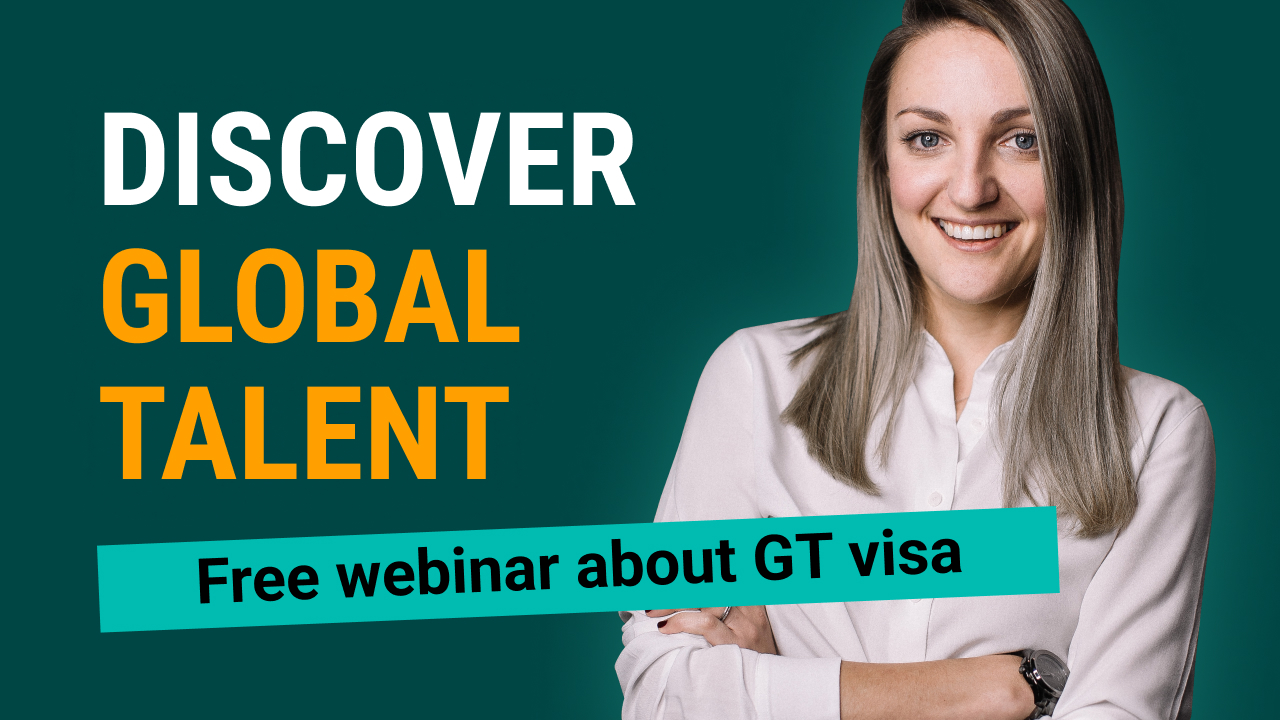This is a step-by-step guide on getting the UK Global Talent Visa. We’ll explain exactly what the visa is and what you need to know to meet the eligibility criteria for the UK Global Talent visa in 2025. Whether you’re in tech, the arts, or science & academis, we’ve got expert advice to help you understand what’s expected and how to get started on the right foot.
What makes this guide different is that it’s packed with practical tips and real client cases. You’ll learn how to prepare your application, what documents to gather, and how to avoid common mistakes. By the end, you’ll feel more confident about your chances and know exactly what steps to take next.
If you need personalised guidance and dedicated support, you can work with our team by purchasing a full UK Global Talent visa package. Alternatively, you can get an in-depth evaluation of your case during our 60-min Global Talent consultation.
👉 Learn more about the UK Global Talent visa with our recent live webinar 👇
What is a UK Global Talent Visa? Overview
The UK Global Talent visa is for top-tier professionals and rising stars in fields like tech, arts, and academia, letting you live and work in the UK while contributing your expertise. It’s ideal for those with a proven talent or great potential. Formerly known as the Tier 1 Exceptional Talent visa, the UK Global Talent visa now has no annual cap and simpler requirements, making it easier for exceptional individuals to move to the UK. By the way, the UK is one of the best countries with talent visas worldwide.
The process can take you anything from two to six months. The UK Global Talent Visa is issued for either 3 or 5 years (if you are a Talent – for 3 years, if you are a Promise – for 5 years). It is extendable and you can apply for a permanent residence permit after it (ILR – Indefinite Leave to Remain). After one year on the ILR, you can apply for British citizenship.
As Global Talent visa expert, I am seeing a positive shift in the new immigration white paper published by the UK Government on 12th of May 2025 towards potential UK Global Talent visa applicants. While most routes face tighter restrictions, they’re actually promising to “make it simpler and easier” for top talent.
The government is clearly prioritising scientists and creative professionals (specifically design) as well as AI specialists. For professionals in these fields, this means potentially faster processing and fewer hurdles in the upcoming months.
Our advice? If you’re in scientific research or design, now’s the time to consider the Global Talent route – the door’s opening wider.
Elizaveta Morjan
EP Advisory’s CEO and the expert behind our Global Talent visa packages | Book a call with Elizaveta

How is the UK Global Talent Visa different from Work Visa (Skilled Worker)?
When considering a work permit abroad, most people think of a standard work visa. In the UK, this is the Skilled Worker visa.
Generally, getting a Skilled Worker visa can be easier since the employer handles most of the paperwork. You can apply for jobs from overseas, interview, and secure a position with a UK company.
However, there are some key differences:
– Eligibility: not all companies or professions qualify. The UK government maintains a list of approved employers with visa sponsorship licence.
– Employer preferences: even if a company has a visa sponsorship licence, they might not hire foreign workers due to higher costs or internal policies.
– Job flexibility: the Skilled Worker visa ties you to a specific employer, you are generally not allowed to do consulting work or set up your own company while being on a Skilled Worker visa. Changing jobs means you’ll need to find a new employer who can sponsor you again. This visa also offers limited or no social security, which can be a drawback if you have a family.
– Requirements: you must pass an English test, provide proof of income, and maintain a certain amount of money in your bank account.
In contrast, the Global Talent visa only requires proof of your exceptional talent. It offers much more flexibility—you can work, freelance, switch jobs, or start your own business without needing to prove English proficiency or meet specific income levels.
The Global Talent visa has just two restrictions: you can’t work as a doctor or a professional sportsman, and you can’t claim public funds like benefits or pensions. Otherwise, you have the freedom to live and work as you wish.

Under what field can you apply for a UK Global Talent Visa? Eligibility
You are eligible for applying if you have been actively building your career and sharing knowledge in one of the three areas:
- arts and culture
- digital technology
- academia or research
You should be able to explain why your presence in the UK would be beneficial to the local economy, and how you wish to make the most out of your potential and grow in your chosen field.
It would be quite hard to list every single profession that is eligible for the Global Talent visa – there are many examples of this visa obtained by marketers, HRs and other related job titles rather than specifically arts and tech specialists and scientists. To give you a rough idea of who can apply under this visa route, here are some of the occupations:
| Field | Key Professions |
|---|---|
| Arts and Culture | Event Managers & Producers, Architects, Artists, Designers, Dancers, Musicians, Theatre Professionals, Film Professionals, Writers, Photographers |
| Digital Technology | Fintech Professionals, Cybersecurity Professionals, AI Professionals, Gaming Industry Professionals, Developers, Data Analysts, Marketers, HRs, and other Business Professionals in Technology |
| Academia and Research | Researchers, Medical Professionals, Engineers, Social Science Professionals |
Nailing your self-presentation for this visa is crucial. You need to thoroughly research the application and endorsement requirements, and EP Advisory were the ones who made the process so much easier for me.
Max Kharchenko
Chief Product Owner, our client and a Global Talent visa holder
Exceptional Promise or Exceptional Talent for UK Global Talent Visa: What is the difference?
The visa is divided into two categories: “Exceptional Promise” and “Exceptional Talent”.
Promise is suitable for those who are at the beginning of their professional or creative journey and have under 5 years of experience. In simple terms, there is no need to be the world’s biggest star in your field, and overall our stats indicate that Promise is indeed easier to get than Talent. However don’t let the requirements fool you: you still need to show quite a few achievements to be endorsed under this visa category. We’ll get to that in a second.
Talent is a category where demonstrating outstanding professional achievements is vital. Generally those who apply under this category need to have worked in their professional field for over 5 years. The benefit of this category is that you only get granted a visa for 3 years, after which you can apply to ILR. That’s one of the quickest ways of getting a permanent residency and citizenship in the UK! Whilst in the case of Promise, you will need to wait for 2 years longer before applying for your ILR, and only get your citizenship after living in the country for a total of 6 years.
Another thing to note is that even if you applied for an endorsement under Promise but the endorsing body believes that you have achieved enough to be a Talent, you’ll be granted a Talent. So overall applying under Promise is a somewhat safer option if your experience in the field doesn’t massively exceed 5 years in total so far. Here’s a quote by our client to help you get a better understanding of it.
I was applying to Tech Nation for the Global Talent visa endorsement as a performance marketer for tech startups. Even though I’ve worked in marketing for nearly 9 years, only the past 4.5 of them have been specifically within the area of performance marketing and digital technology, whilst the first few years I was mainly just writing copies for marketing comms. So when choosing between the Talent and Promise categories, Promise was more suitable for me – and way more realistic in terms of requirements!
Luma Manina
Our ex-employee and a Global Talent visa client
Of course, every story is unique, and Global Talent is a relatively new UK visa category, so the rules change from time to time.
I am applying for the Global Talent Visa in the UK. Where do I start?
Let’s start with the good news: for the Global Talent Visa, knowledge of English is optional, and you don’t need to go through any interviews or exams. In fact, we’ve seen cases where arts professionals have been granted the visa with just an A2/B1 level of English! Additionally, no proof of income is required.
The Global Talent Visa is obtained in two stages:
Stage 1: Endorsement
This stage involves applying for an endorsement from a recognized body, such as Tech Nation for digital technology or the Arts Council for the arts. Importantly, Stage 1 is not an immigration stage, meaning it does not affect your immigration history or status. During this stage, the focus is solely on assessing your skills and expertise in your chosen field. You will receive a Unique Application Number (UAN) after submitting the endorsement application, which you’ll need when applying to the endorsing body.
Stage 2: Visa Application
After receiving your endorsement, you can apply for the actual visa in Stage 2. This is when your immigration status is assessed, and if successful, you’ll be granted the Global Talent Visa, allowing you to live and work in the UK without restrictions.
In summary, Stage 1 focuses on endorsement based on your talent, without affecting your immigration status, and Stage 2 is where the immigration process begins.
How to apply for UK's Global Talent Visa endorsement?
When applying for the Stage 1 endorsement of the Global Talent Visa, it’s essential to first complete the Stage 1 application on the UK government website. This process will provide you with a Unique Application Number (UAN), which is mandatory for submitting your application to the endorsing body (like Tech Nation for digital technology applicants).
Without this unique number, you won’t be able to proceed with the endorsement process on the endorsing body’s platform. The endorsing body requires this number to identify and link your application to their evaluation process.
Here’s the correct link to apply for Stage 1 and get your unique application number: Global Talent Endorsement Application.
Once you receive the UAN, you can use it to submit your endorsement request via the relevant endorsing body. There are six endorsing bodies currently in the UK assessing your talent. Read our full guide on how to get an endorsement for the UK Global Talent visa.
What are the six endorsing bodies for the UK Global Talent Visa?
- Tech Nation
- Arts Council England
- British Academy
- Royal Academy of Engineering
- Royal Society
- UK Research and Innovation (UKRI)
After receiving the endorsement, you can proceed with applying for the visa itself (Stage 2). You’ll use the endorsement and your UAN to complete this stage, and if successful, you will be granted the Global Talent Visa, allowing you to work in the UK without restrictions. The main purpose of Stage 2 is for the immigration officers to run the entry clearance checks on you (to ensure you’re not a criminal!), stamp the visa in your passport and issue a Biometric Residence Permit (BRP) which you will pick up upon moving to the UK (this will change from December 2024 when all permits will be electronic and not physical).
As Global Talent visa consultants, we’ve noticed a big shift for digital tech applicants recently. The bar’s been raised like ten times higher in the past few months.
Just to give you the context, Tech Nation, the endorsing body for the tech field, initially said it’d shut its doors by March 31, 2023. But guess what? It didn’t close up after all and kept taking applications (probably because they couldn’t find a replacement in time). Our guess is, many people rushed to apply before the supposed shutdown. So, from April 2023, we’ve been hit with more rejections than ever before, and we’ve had to fight them all with appeals. Other endorsing bodies also upped their game, but not as drastically as Tech Nation.
Our advice? Get ready way more seriously and thoroughly than you might’ve thought just a bit back.
Elizaveta Morjan
EP Advisory’s CEO and the expert behind our Global Talent visa packages | Book a call with Elizaveta
Get endorsed for the UK Global Talent visa with our help
If you wish to immigrate to the UK under the Global Talent visa – we can help. With an exceptional success rate of 93%, we know all about the requirements for the Global Talent visa.
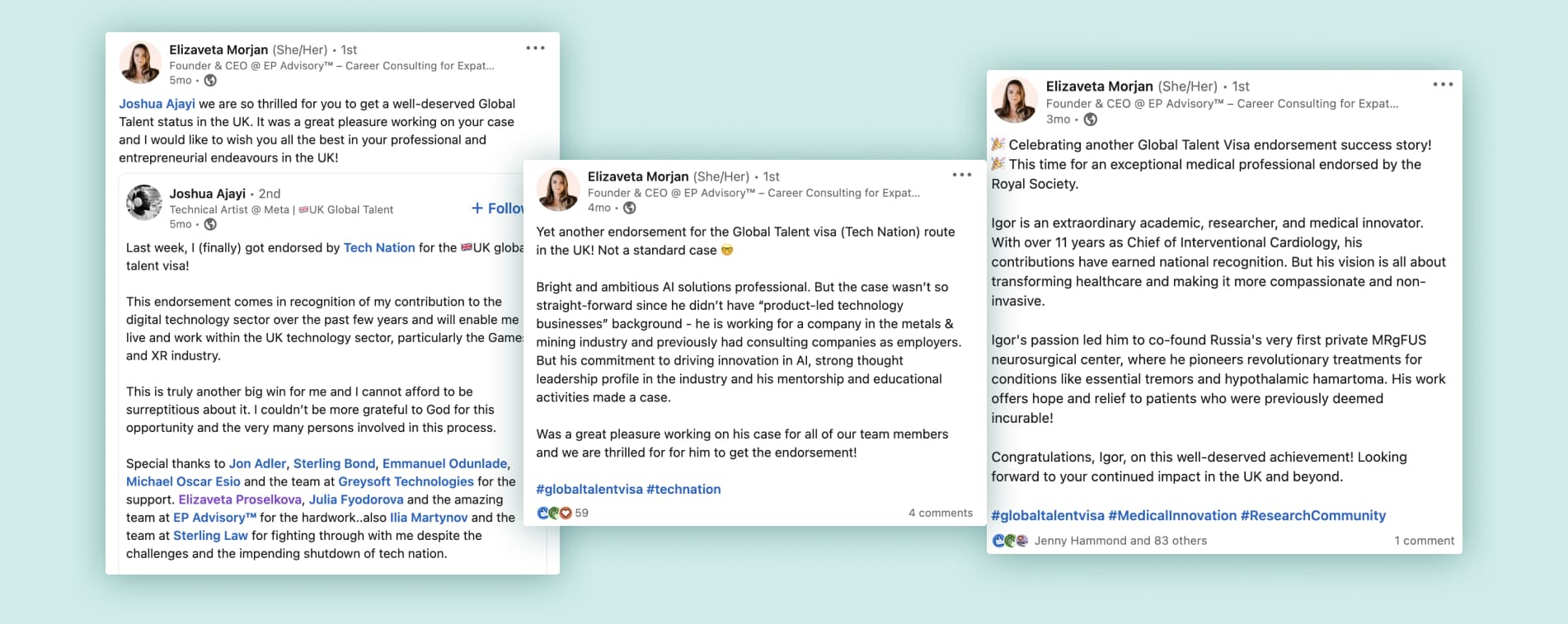
Global Talent visa through Tech Nation UK
We at EP Advisory get tens of enquiries from tech applicants every day. As you can see above, the Tech Nation Global Talent visa is open not only for technical professionals but also for those working in this sector with non-technical backgrounds (business). For instance, if your role is in growth marketing, sales, or product management at a tech company, you might be eligible to apply!
Specifically, some “Venture Capital partners and Senior analysts” have successfully gained endorsements through us. This reference indicates that individuals working in venture capital, including partners and senior analysts, can be considered for the Global Talent Visa in the UK under certain conditions, likely related to their contributions to the tech sector or their specific expertise in digital business environments.
We have written several articles on the recent changes to the Tech Nation’s guidelines (here is the link) and the main rejections reasons for you to strengthen your Tech Nation Global Talent visa case (click here to read).
Tech Nation – Eligible disciplines
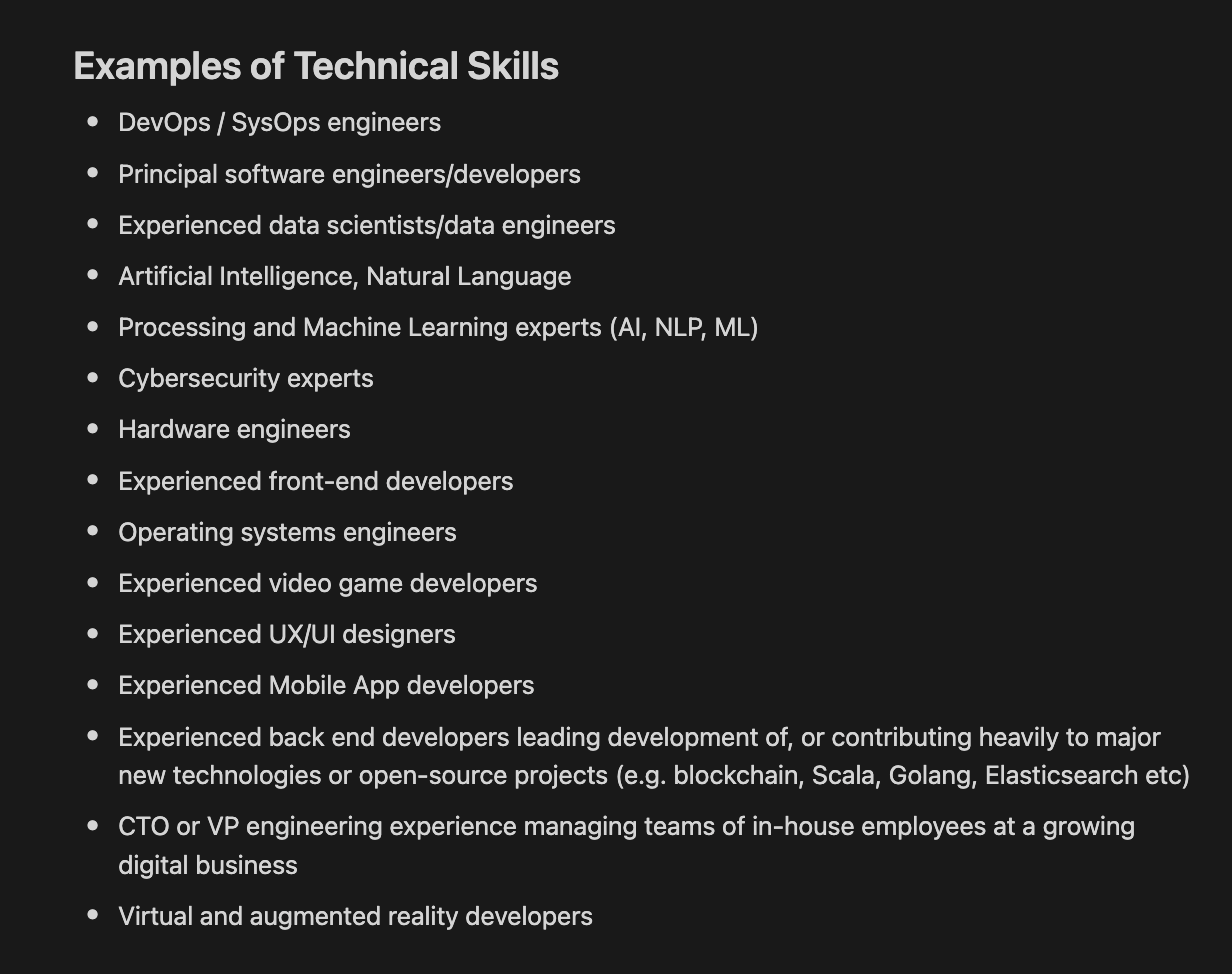
Tech Nation website on all eligible disciplines:
https://technation-globaltalentvisa-guide.notion.site/
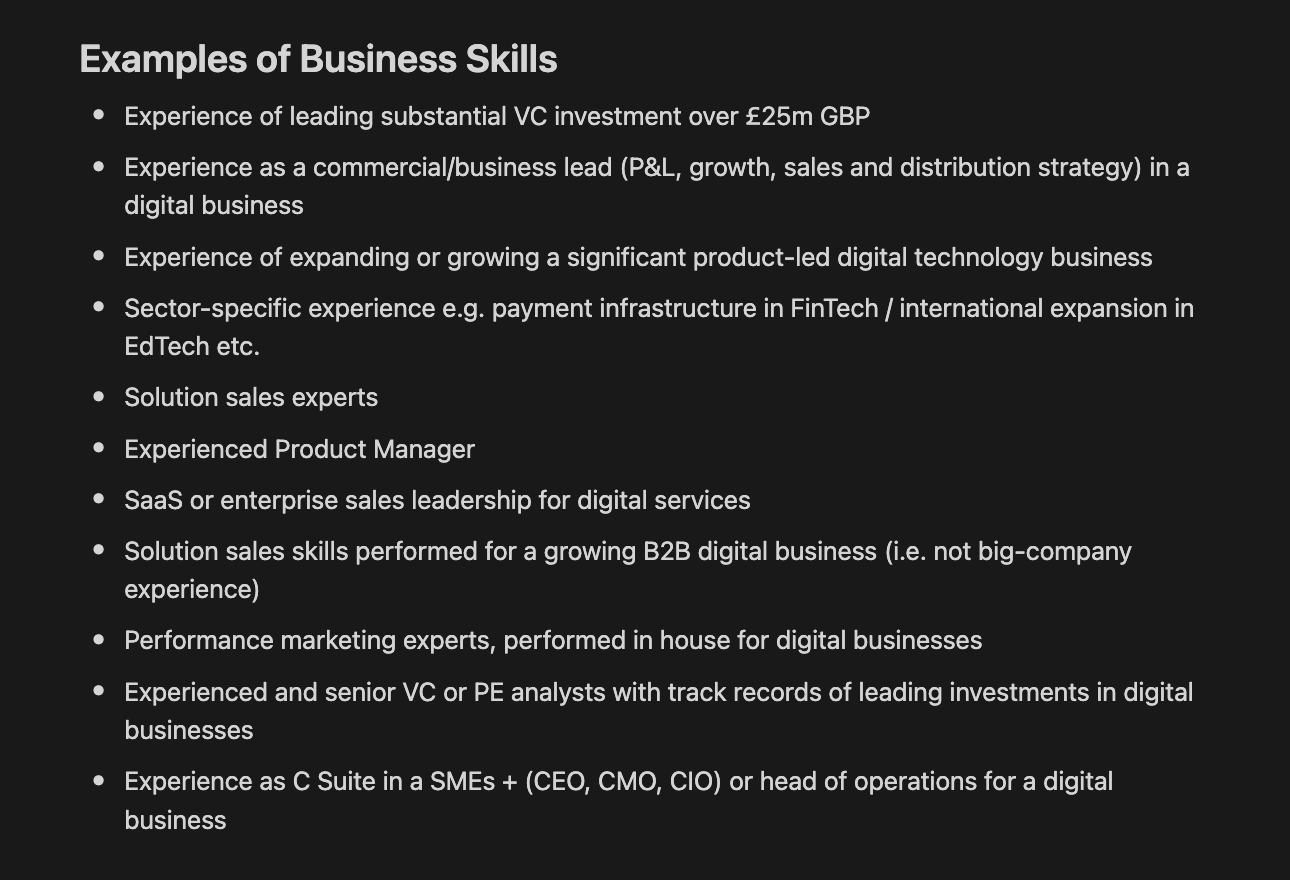
Tech Nation website on all eligible disciplines:
https://technation-globaltalentvisa-guide.notion.site/
Tech Nation – Rules for employers and own start-ups
If you are an employee or an entrepreneur, the rules towards the company are the following:
- Importance of working for a product-led digital business.
- Examples of eligible companies: Amazon, Spotify, smaller tech start-ups.
- Exception for niche technical expertise, like AI in heavy industries.
Tech Nation – Which documents you need to submit
When applying for Tech Nation UK Global Talent visa endorsement, you would normally need to upload 15 documents: 3 Letters of Recommendation (LORs), 1 CV, 1 Personal Statement, and 10 Evidence pieces (3 A4 pages each).
Tech Nation – Rules for referees of your Letters of Recommendations
When it comes to selecting your referees, try choosing those who:
- are or were your direct bosses who can confirm your; achievements/experience written in your CV;
- have strong experience working for tech companies (avoid people who have background of working for consulting, outsourcing companies, agencies and other non-tech businesses, e.g. PepsiCo, Bosch, etc.);
- have a good LinkedIn profile (all sections filled, recent activity, etc.);
- have a Global Talent visa already;
- are based outside your country of origin or not the same nationality as you.
We recommend for you to include here as many potential referees as possible.
For Tech Nation, there is no requirement to have a UK-based referees. So they can be from your come country or elsewhere in the world. We have successful cases when all 3 referees were from the applicant’s home country.
Elizaveta Morjan
EP Advisory’s CEO and the expert behind our Global Talent visa packages | Book a call with Elizaveta
Tech Nation – What are the evidence pieces?
10 Evidence pieces go towards Mandatory criteria and Optional criteria. Each evidence piece should be no longer than 3 x A4 pages. There are 4 optional criteria, and you need to satisfy at least 2 of them to get the endorsement.
4 optional criteria for Talent applicants:
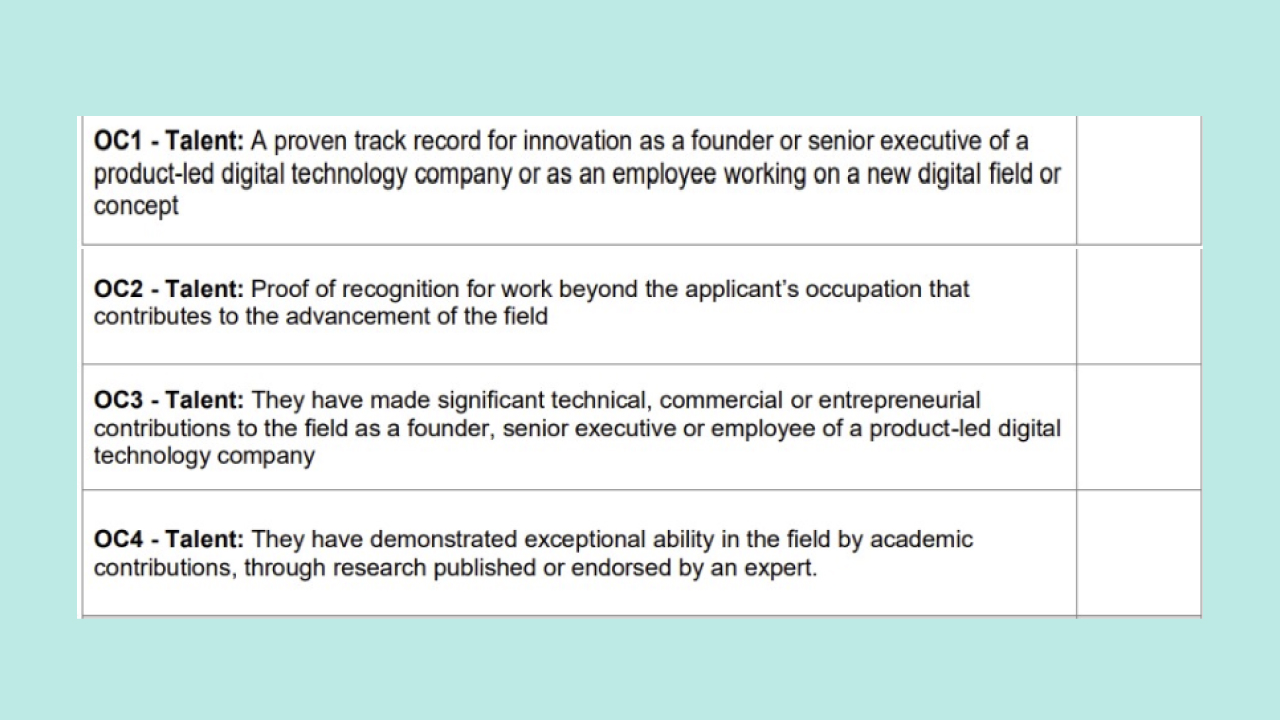
4 optional criteria for Promise applicants:
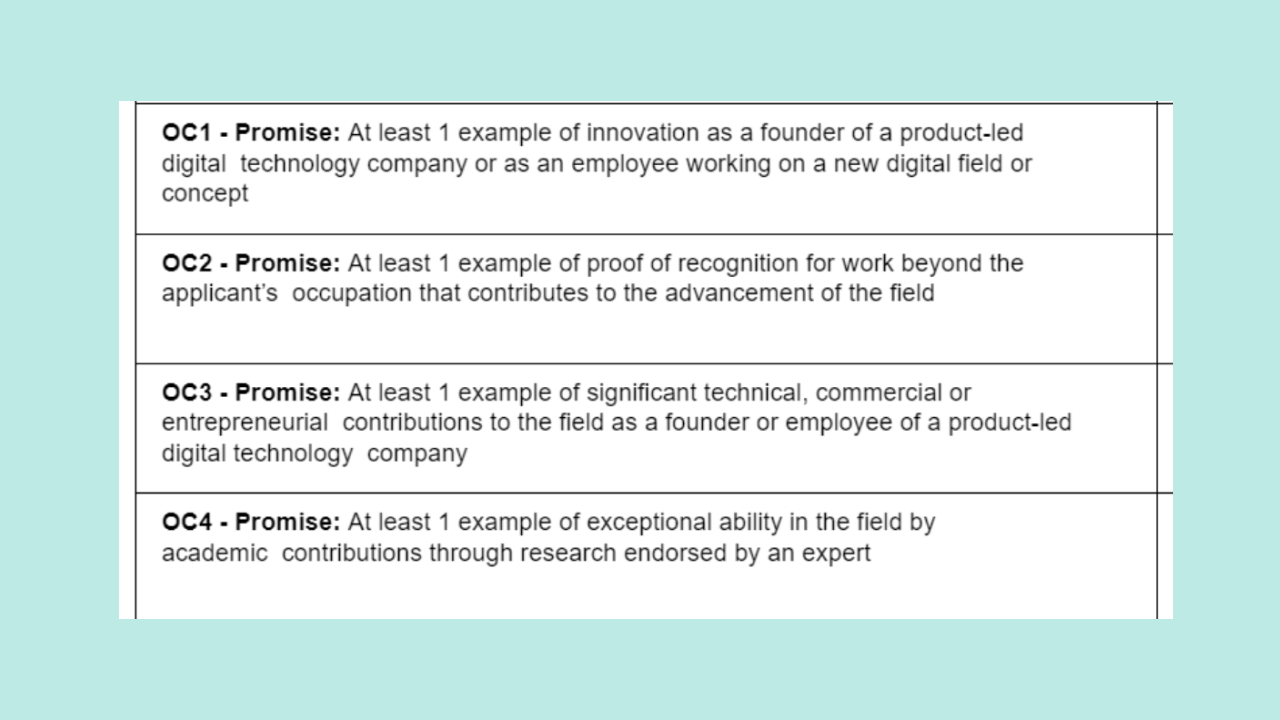
Optional Criteria 1 (OC1): a proven track record for innovation as a founder or senior executive of a product-led digital technology company or as an employee working on a new digital field or concept;
- In our experience at EP Advisory, this criteria is quite commonly used. As an applicant, you need to show innovation (e.g. new product feature, new product development, new market, new marketing strategy, etc). You can, for instance, attach press releases about those innovations.
- Example: Yuri, Front-End Developer, created a price match feature for a booking platform; this innovation received some media attention.
Optional Criteria 2 (OC2): proof of recognition beyond the applicant’s occupation that contributes to the advancement of the field;
- This is hard to prove but still possible. As an applicant, you need lots of evidence of speaking at conferences, media recognition, courses developed by you, or your participation in official mentorship programmes. We would recommend at least 5-7 articles in the media, podcasts, YouTube videos (not your own channel, but elsewhere), conference speaking, panel discussions, judge appointments, etc.
Mentorship has to be part of an organised/structured programme with selection process, you cannot mentor one start-up or a group of people and include this as evidence for activities beyond occupation.
When we feel there is not enough of evidence for OC2, but the client has some media recognition or training, we would use those documents for mandatory criteria.
Elizaveta Morjan | Book a call with Elizaveta
EP Advisory’s CEO and the expert behind our Global Talent visa packages
Optional Criteria 3 (OC3): significant technical, commercial or entrepreneurial contributions to the field made as a founder, senior executive or employee of a product-led digital technology company;
- This is also quite common. You need to show quantifying achievements related to your field (revenue generated, app downloads, fundraising, team growth, increase in website visitors, etc.)
Optional Criteria 4 (OC4): exceptional ability in the field demonstrated by academic contributions, through research published or endorsed by an expert.
- We at EP Advisory only had a couple of people applying with OC4. Those were people with patents, trademarkers, IP property, and scientific articles published. Your application really has to have some weight to satisfy this criteria.

Visa holders’ experiences of the Global Talent application process
Recent research commissioned by the UK Home Office, conducted by Ipsos, looked into the effectiveness of the Global Talent Visa program. It included an online survey completed by 4,025 successful visa holders, 10 case study interviews, and 25 in-depth interviews
Global Talent Visa Application and Endorsement Satisfaction
The high level of satisfaction with the overall process was reflected in visa holders’ views about the 2 main stages of the application process: endorsement (91% satisfied) and main visa application (87% satisfied). Overall visa application success rate exceeds 90%. Here are some key findings on applicant satisfaction:
- Over 90% of applicants successfully obtain the visa.
- Direct endorsement success is also over 90%.
- The overall visa application process has an 85% success rate.
- Around 90% of applicants found the visa application form easy to complete.
Global Talent Visa Success Rate Overview
In 2023, the success rate for the UK Global Talent Visa rose to around 75%, though exact approval rates are not fully disclosed by the UK Home Office and can vary based on several key factors:
1. Field Expertise and Achievements: High-impact contributions, such as published work, awards, or peer recognition, strongly influence approval chances.
2. Endorsements from Esteemed Bodies: Endorsements from reputable UK organisations, like Arts Council England, the Royal Academy of Engineering, the Royal Society, and the British Academy, play a crucial role in visa success.
3. Immigration History: A positive immigration record and no previous issues with UK authorities can enhance approval likelihood.
4. Commitment to the UK: Demonstrating how the applicant’s continued work will benefit the UK economically and culturally is essential.
Tech Nation – Examples of our clients getting UK Global Talent visa
Kathrin, Gaming professional: Despite her young age, Kathrin has accomplished a lot in the gaming industry in Germany. She founded and successfully grew her gaming start-up. She fundraised for it and received multiple awards and grants for the games she’s developed. Kathrin also became a judge and was featured on national TV.
Alex, Entrepreneur: In addition to successfully setting up and exiting multiple start-ups in the USA, Alex has been doing a lot of thought leadership in his field (fintech). From setting up fintech communities to acting as a start-up mentor for world-famous accelerators.
Emil, Product manager: With only 4 years of relevant product management experience, Emil has managed to increase his income by 300% in the past 3 years. He had developed innovative product features that had an impact on the industry and won multiple hackathons in his home country.

Scientists, researchers and academic applications for the UK global talent visa
For science and engineering, there are 4 endorsing bodies that have similar criteria: The Royal Society, The Royal Academy of Engineering, UK Research and Innovation, and The British Academy.
In simple terms, there are 4 different routes to apply for an endorsement with one of these endorsing bodes – from an official academic or research appointment (if you were offered a position at one of UK research organisations) to receiving an individual fellowship or a research grant. All of our clients here at EP Advisory have gone for Route 4 – Peer review.
Mandatory Criteria for Route 4 – Peer review
All boxes should be ticked:
- The applicant must be an active researcher in a relevant field, typically within a university, research institute or within industry.
- The applicant must have a PhD or equivalent research experience (including industrial or clinical research).
- The applicant must provide a letter of personal recommendation from an eminent person resident in the UK supporting the Global Talent application.
- Be a member of their professional society/body/association in the field of their research (have an active membership, ideally in EU or the UK).
The applicant must meet 1 or more of the following Qualifying criteria.
Qualifying criteria:
- Scientific publications (does the person have Google Scholar and/or ResearchGate account – can Google it). The good minimum of English publications is around 10. Ideally, those 10 publications will be in the past 5 years, but if they are older, it is okay too.
- Patents.
- Prizes or awards.
- Funding/grants (have they secured significant funding for their work in the past 10 years? If so, do they have a proof (usually, its a publicly available information; they need to have their name mentioned (sometimes, the grant went to someone else and they were just supporting the research -> this wouldn’t work).
- Media recognition (conference speeches, articles (non-scientific) about their research or themselves/their career/their stories).
- Innovation (we had clients from academia who also work in the industry (oil & gas) and they have created innovative solutions based on their research for large corporations or start-ups).
Science, engineering & research – Examples of our clients getting Global Talent visa
Adela, Biopolymer specialist: She was based in Russia and specialised in biopolymers. She demonstrated the diverse range of eligible fields and backgrounds, including a PhD (from Russia), an active research position, scientific publications, the Biopolymer Society membership, and media recognition.
Igor, Heart surgeon: In addition to PhD and research, he had industry innovative experience – he developed non-invasive heart treatment methods, showcasing the application of innovation in medical fields.
Alex, Oil & gas scientist and software engineer: Alex is an active researcher in the oil&gas field and has done some significant research in Australia. He is also a holder of a PhD in his field as well as industry experience (software engineering) in the oil & gas field in the UK.
Who is not allowed to apply for the Global Talent visa?
Before diving in, let’s get one thing straight: applying for this visa is a smart move only if you tick all the boxes for your field and have the documents outlined in the guidelines.
Below is some additional information on the disciplines within science, tech and arts that are ineligible for the Global Talent visa.
Science applicants, make sure to consult the full list of eligible disciplines. If your job isn’t there, unfortunately, it’s better to explore another immigration route, like the Skilled Worker visa or a Student visa for a funded PhD programme.
Tech and digital applicants can refer to these guidelines:
Eligible: Technical applicants (e.g., programmers) from non-technical organizations.
Eligible: Non-technical applicants (e.g., business roles) from technical organizations.
Ineligible: Non-technical applicants from non-technical organizations.
Tech Nation’s examples of off-limits fields include:
- Service Delivery, Process Delivery, Outsourcing, Consultancy (technical or management), ERP Consultancy, Systems Admin and all related fields.
- Corporate roles or experience of managing large corporate teams.
- Junior investors/analysts. Such specialisms must be supported by an investment track record made at a senior level and are not suitable for Global Promise.
- Business skills apply to in-house work within product-led digital technology companies, not tech-enabled or service companies such as agencies, outsourcers, marketing firms etc.
Generally speaking, Tech Nation wants to see applicants from “product-led digital technology companies”. It could be any online platform or an app but shouldn’t be a consultancy.
Big non-tech corporations are not usually very welcome by the endorsing committee either, but there are some exceptions. For instance, one of our successful clients was an AI specialist working at an oil and gas company. He did get an endorsement because his experience was very niche and highly relevant to the UK’s economy – developing AI in such a complex industry! If you wrap it up properly, especially if you have some research publications and articles on the subject, you can get it.
Elizaveta Morjan | Book a call with Elizaveta
EP Advisory’s CEO and the expert behind our Global Talent visa packages
For arts & culture applicants, Arts Council provides a comprehensive list of the no-go jobs. Take a look:
| Category | No-Go Jobs |
|---|---|
| Fashion & Beauty | Hair styling, Makeup for fashion, Fashion stylists, Nail art, Health and beauty |
| Photography & Visual Arts | Editorial and fashion photography, Commercial photography, Photography, videos, CGI, design, and illustration for marketing campaigns, advertising, branding, or corporate events |
| Art Direction | Art and creative direction for marketing campaigns, advertising, or branding |
| Journalism | Modeling, Written and photographic journalism, Investigative journalism, Long-form journalism, General writing about the arts |
| Education | Researchers, Education – teachers and lecturers, Music education or any artistic education in higher or further education |
| Consultancy & Marketing | Conference programming, Consultancy, Marketing |
| History & Museum Roles | Historians, Art historians, Non-creative roles in museums and galleries like front of house or administration |
| Design & Manufacturing | Design and manufacturing of functional items such as textiles or furniture, Design work outside the Visual Arts context (e.g., graphic design, product design, industrial design, promotional work, advertising, commercial design, branding, visual identity, craft design, service design, typography) |
| Illustration | Technical, scientific, medical, architectural, or fashion illustration |
| Media & Broadcasting | Factual podcasts, Radio DJs |
| Performance Arts & Content Creation | Competitive dance / Dancesport, Digital content creators (YouTube channels and Instagram influencers/models) |
| Miscellaneous | Art dealers/collectors, Art critics, Instrument makers, Toy makers, Tattoo artists, Professional wrestling |
Which documents are required?
How to get a Global Talent visa? At the first stage of application, you are required to put together a pack of documents that you submit to the endorsing body in your field. Scroll down if you want to see some notes specifically for your field: technology, arts or academia.
In most cases, 3 references and 10 supporting documents are required. The academia and research application pack slightly differs: science applicants are normally required to provide a CV and 1 letter signed by a member of the science community.
More about the documents required for the Tier 1 Global Talent Visa:
1. A CV that shows you have been active in your professional field for the last 5 years.
- Start by searching your name in Google. Endorsing bodies do Google search on all potential visa applicants.
- Update your Linkedin profile and make your other social media pages look a bit more professional just in case.
- It is not necessary that your education is relevant to your chosen field. It will be enough if you are working and growing within the profession.
- You don’t have to hold a senior position in the company. What matters is your contribution to the business.
2. Personal statement. This is your chance to explain in detail how you qualify for the eligibility criteria and how you would benefit the UK’s economy if you get the Global Talent visa.
3. Three letters of recommendation. Each of the three fields has slightly different requirements. Let’s look at recommendation letters required for arts and culture as an example:
- The first letter is from an organisation that fits your professional field and is UK-based. This is something that many candidates who have not yet lived in the UK struggle with. But since April 2025 there is also a requirement for you to have a working artistic relationship with this person.
- The second letter is from an organisation that may be based outside the UK. In this letter, we advise that you write about how the recommending expert met you and what it was exactly that you did at that company.
- The third letter is from an organisation or an individual who has a solid reputation and track record in your professional field (UK or outside).
The endorsing bodies may contact you to clarify some details, so make sure to include all your valid contact information.
The most difficult stage of the process for me was to prepare letters of recommendation from the experts in the field. These people are extremely busy and you have to adjust to their schedules. I had to do the editing at night and on holidays to meet the set deadlines.
Vitaly Markov
Data Engineer
4. Additional pieces of evidence (normally up to 10 files) – anything that demonstrates your exceptional talent or a promise to become a leader in your field. Feel free to show achievements outside your main professional activity.
- Awards or nominations
- Additional recommendation letters
- Lectures or articles hosted or written by you
- Interviews with you or any publications about you (Some blogs might not be accepted – for instance, Medium or VC.ru are not generally accepted as evidence)
- Exhibitions and portfolios. Mention any exhibitions or publications with your name on them
- Employment contracts or financial statements
- Mentoring experience and speaking engagements (especially for digital technology applicants)
Basically, any documents that show you are an expert in your field and that your potential will be useful to the UK.
In some cases (e.g. for science applicants) you may need to send hard copies of the documents at a later stage. For digital technology applicants, e-copies of all documents will suffice.
Consider the case of a young musician applying from India. Her standout card was being selected, along with her band, for a British TV programme focusing on musicians. While they didn’t make it to the final round, the commission was still impressed by the achievement. Adding to this, her music was chosen to be played in public spaces designated by the local City Hall. These two facts illustrated her visibility and recognition in her home country as well as in the UK – a solid foundation for meeting the Exceptional Promise criteria.
Elizaveta Morjan
EP Advisory’s CEO and the expert behind our Global Talent visa packages | Book a call with Elizaveta
Key facts for each field: technology, arts, and science
Once again, if you’re about to apply for this visa, we recommend you to look for the guidelines issued by the endorsement body in your field and take some time to read them thoroughly. These official resources provide the detailed ins and outs that no article can fully replicate.
Below we have listed the key things that you should know about this visa, based on our experience of applying for our clients in each field.
Prestigious prizes – Arts and Science mainly
Good news! If you’ve been awarded one of these prestigious prizes, you’re in for a smooth ride. You can apply for a Global Talent visa without needing an endorsement. These prizes have been handpicked by the experts in the field as clear indicators of exceptional talent.
Here are some examples to give you a rough understanding of the type and level or prizes:
Arts and culture prizes
- Grammy Award
- Tchaikovsky Prize
- Tony Award
Film and television prizes
- BAFTA
- Golden Globes
Science, engineering, humanities, social science and medicine prizes
- Benjamin Franklin Medal
- Kyoto Prize
- Nobel Prize
These are only examples. Please find the full list of accepted prizes here.
Tech Nation – Digital Technology
Here’s what you need to know when applying through Tech Nation:
Impressive Track Record: Make sure to showcase your impact internationally, the importance of your work, and your career history.
Strong Recommendations: Get strong letters of recommendation and evidence to back your application. These letters should be written by recognised experts who know your work well. They can even talk about their own experience to show they know their stuff. It is important that your recommendation letters are not all written in the same style or signed on the same date.
Benefit to UK: Explain how you can help the digital tech sector in the UK. If you are already involved in it at some level (such as mentoring, lecturing, via public speaking etc), that’s even better.
Different Factors: Think about your education, salary, and the reputation of the company you’re associated with, and show your potential.
Past Success: Your past successes, achievements, and experiences are important. The evidence may include screenshots of the internal systems (e.g. CRM with the number of clients or any other platform that proves the results you’re claiming to have achieved).
Technical Experts: Highlight your knowledge of the latest technologies and technical systems. This can be emphasised in your personal statement, in the recommendation letters as well as by screenshots or other proofs of implementation of such innovations.
Business Applicants: Show your investment in commercial ventures or your expertise in digital products. This could be demonstrated by screenshots or exported overview of annual reports or startup accelerators’ letters etc.
Personal Statement: Write a strong statement that explains your impact on the UK’s digital tech industry.
CV Highlights: Summarise your career and important works within three A4 pages.
Art Council – Arts & Culture
CV Requirements
- A CV is needed to gauge your career stage and visa suitability.
- Without a satisfactory CV, even meeting other criteria won’t secure endorsement.
- Include your full artistic career and education details; it doesn’t replace evidence.
- Online CV links/screenshots won’t work; upload a condensed document.
Supporting Evidence: What You Need to Know
- Types of Evidence: You need to provide up to 10 pieces of evidence across media recognition, international awards, and proof of appearances.
- Evidence Format: Each document should be within two A4 pages. Avoid physical objects and digital files.
- Media Recognition: At least two examples of detailed critiques or reviews from credible critics in established media outlets, focusing on your work’s quality.
- International Awards: Show evidence of winning recognised arts and culture awards within the last five years.
- Proof of Appearances: Evidence of your involvement in professional artistic programs in two countries in the last five years.
- Translation: Any non-English evidence needs certified translations.
- Exceptional Promise Criteria: Similar to Exceptional Talent, but with a focus on national or international media recognition.
- Degrees and Awards: Degrees, student awards, and grants aren’t accepted.
- Social Media: Evidence from blogs or social media isn’t accepted.
- Collaborations: You can provide evidence related to your contribution to the work of another individual or group.
Letters of Support
Diverse Validation: Gather proof from well-known organisations that highlight your impact in your specific field. One from a UK-based organisation and another from a national/international cultural group.
Respected Individual Endorsement: Secure a third letter from either another cultural organisation or a respected individual expert in your field.
Credibility of Endorsers: Ensure that the letters are signed by senior figures within the organisations. These individuals should be able to vouch for your excellence, and including their CV or biography can add weight to your application.
Art Council & RIBA – Architecture
Supporting Evidence for Architecture Applicants
Exceptional Talent:
- Show 2+ recent instances of international recognition from architecture sources.
- Prove you’ve won awards or been really important internationally.
- Show your work published or exhibited internationally.
Exceptional Promise:
- Show 2+ recent instances of media recognition in the UK or globally.
- Prove awards or significant contributions in national or international architecture.
- Show work you’ve had exhibited or published internationally in the last 3 years.
Accepted Awards
For example, Aga Khan Award for Architecture, RIBA International Prize, Pritzker Prize, Venice Biennale of Architecture Award, World Architecture Festival Award or another relevant major award.
Letters of Support
Varied Support: Get letters from respected organisations that show your influence in your field. Have one letter from a UK-based organisation and another from a national or international cultural group.
Expert Endorsement: Get a third letter from another cultural group or an expert in your field.
Proof of Expertise: Make sure the letters are from important people who can vouch for you, and they should include their career history too.
Art Council & Pact – Film & Television
Eligibility and Supporting Evidence – Film, Television, Animation, Post-Production, Visual Effects Applicants:
- Apply under Exceptional Talent only, no Exceptional Promise.
- Producers Alliance for Film and TV (Pact) assesses Exceptional Talent applications.
- Show that you’ve won or been nominated for major awards (Oscars, BAFTAs, etc.).
- If you don’t have awards, prove your contributions to the industry. Demonstrate recognition through distribution sales, awards, or nominations.
- Show your role. Explain your part in group projects or collaborations.
- Notable Industry Recognition Awards needed for films with theatrical release.
Letters of Support
Varied Support: Get letters from respected organisations that show your influence in your field. Have one letter from a UK-based organisation and another from a national or international cultural group.
Expert Endorsement: Get a third letter from another cultural group or an expert in your field.
Proof of Expertise: Make sure the letters are from important people who can vouch for you, and they should include their career history too.
Arts Council – Fashion Design
Supporting Evidence
- Exceptional Talent:
- Display 2+ recent examples of significant international media recognition, excluding events and advertisements.
- Prove wins, significant contributions, or nominations for international awards within the past 5 years.
- Provide evidence of catwalk shows, presentations, exhibitions, or international distribution and sales of collections.
- Exceptional Promise:
- Submit 2+ recent examples of recognition from UK or international media.
- Show support and sponsorship from relevant institutions in the last 5 years.
- Offer proof of orders received from luxury retailers, industry recognition, or exceptional graduating collections.
Letters of Support
Triple Approval: Get letters of support from three well-known organisations that prove your expertise in fashion. One of these should be from the UK if you’re aiming for Exceptional Talent.
Important Roles: The letters should be from high-up people like CEOs or Fashion Directors who can endorse your impact.
The Royal Society, The Royal Academy of Engineering or The British Academy – Science and engineering
The endorsement body is allocated based on your field: The British Academy reviews applications from the humanities and social sciences, the Royal Academy of Engineering covers engineering, and the Royal Society covers the natural and medical sciences.
Mandatory Criteria:
- Active researcher in relevant field (academia, industry, research institute).
- Holds PhD or equivalent research experience.
- Personal recommendation letter from eminent UK resident.
- Meets at least 1 Qualifying Criteria.
Four routes for academia and research applicants:
- Academic and Research Appointments Route
- Fast-track endorsement for those with eligible positions at UK higher education institutions or research institutes.
- Responsibilities include academic, research, innovation leadership, or directing research projects.
- Roles like Vice-Chancellor, Dean, Research Institute Director, qualify.
- Eligibility based on significant academic, research, or innovation responsibilities.
- Endorsing institutions require job description and statement of guarantee.
- Timeline: 14 working days for initial assessment.
- Individual Fellowships Route
- Fast-track endorsement for recipients of approved individual fellowships within the last 5 years.
- Fellowships from British Academy, Royal Academy of Engineering, and Royal Society qualify.
- Award letter to contain name, start date, duration, and fellowship details.
- Fellowship award letter should include name, start date, and duration.
- Timeline: 14 working days for initial assessment.
- Endorsed Funders Route
- Fast-track endorsement for researchers named in approved grant applications by endorsed funders.
- Researchers hosted or employed by UKRI-approved institutions qualify.
- Diverse fields eligible: researchers from various disciplines eligible.
- Timeline: 14 working days for initial assessment.
- Peer Review Route
- Standard endorsement for applicants submitting applications for full peer review.
- Eligibility based on exceptional talent or promise in research or innovation.
- Two expert recommendation letters required, one of which must assess applicant’s reputation.
- Eminent individual and expert in applicant’s field write letters.
- Timeline: up to 8 weeks for initial assessment.
Experts evaluate:
- Career history, international standing, publications, prizes, funding, impact.
- Strength of personal recommendation letter.
- Potential benefits to UK research and society.
- Prestigious prizes, funding secured, leadership in field.
Submission details
- Hard copy to Home Office after online form.
- False evidence leads to application rejection.
- English translations for non-English documents.
Global Talent visa fees. How much does it cost to apply for the Global Talent Visa?
Stage 1. Submission of application to the UK endorsing bodies: £561 (2025). Please note that this amount will not be refunded if the application is unsuccessful.
Stage 2. Submission of the approved application for visa obtainment purposes: £205 (2025).
Health surcharge (IHS): £1035 (2024) for each year of basic health insurance, which you have to pay this, when you apply for Stage 2.
It is possible to postpone a part of this sum: you can choose to apply for a shorter period than your endorsement. For instance, if your endorsement is valid for 5 years but you only want to stay for 3 years to begin with, then you only pay for 3 years of health surcharge and submit another Stage 2 application a few years later.
For instance, if you are applying for a 3-year visa, £561 + £205 + £1035*3 = £3,871.
If you’re applying based on an eligible award, you’ll pay the full £716 when you apply for the visa.
If you’re including your partner or children in your application, they’ll each need to pay £716 plus the health surchange (per dependant per year).
The Global Talent visa fees are one of the key reasons for doubts when considering applying for this immigration route. You can end up paying nearly £4,000 in one go, that’s over four thousand Euros! However, the vast majority of rejections so far have happened at the first stage of the application process. So even if you are not granted an endorsement, it’s just the £524 you may be losing, and not the entire visa fee with the healthcare surcharge.
Healthcare surcharge changes in 2024
- The UK Parliament approved a law increasing the Immigration Health Surcharge (IHS) fees, which will go into effect on February 6, 2024.
- The annual IHS fees for adult applicants will increase to £1,035 per person – a 66% increase from the current £624.
We can help with your Global Talent document pack
Find out more about out services for those who wish to immigrate to the UK under this visa route. With an exceptional success rate of 93%, we know all about the requirements for the Global Talent visa.
What are the reasons for the Global Talent visa refusal?
There are a few typical reasons the Global Talent visa may be rejected:
- Incomplete set of documents. If the endorsing body does not see the required minimum of the documents, they may refuse without any explanation.
- Inaccuracies in the documents or incorrect document identification.
- Not enough information is provided.
- Not enough evidence of your talent or contribution (Significant Contribution).
- There is not a strong enough link to the UK. It may seem to the experts that your plans can be implemented in any country and you do not need to be in the UK at all.
You can apply for a visa refusal review. You can re-apply for the Global Talent visa within 28 days of getting a decision.
In 2023, Tech Nation issued more refusals than ever before. When justifying their decision, they often say that they’re looking for applicants that are the top 1% of the cohort. They also notice and downgrade you if your letters of support were written in the same style or signed on the same date. If you received a refusal, please remember that it’s not about you personally – the bar has been raised for everyone! It’s definitely worth submitting an appeal as we’ve seen some really positive outcomes of that.
Elizaveta Morjan
EP Advisory’s CEO and the expert behind our Global Talent visa packages
How long will it take to get a UK Global Talent visa?
- Surprisingly, the most time-consuming part of the process is usually the prep work. Even though it might seem like a couple of weeks’ task, writing all the recommendation letters and the personal statement tends to take around 2–3 months based on our clients’ and friends’ experience.
- Stage 1 (with an endorsement body) takes up to 8 weeks.
- Take into account the expiry date of your approval from the endorsing bodies. If you are successful at the first stage, you will receive a letter with a deadline of 3 months. During this period you will have to apply for the next stage of the UK Talent visa.
- Stage 2 (with the Home Office) usually takes 3 weeks if you apply from outside the country or 8 weeks if you switch to this visa route within the country. However, the UK government recently announced that the period of consideration of outside-the-country applications had been temporarily extended from 3 to 6 weeks.
In total, your application might take anything from under 2 month in an absolutely perfect scenario to as long as half a year if the circumstances aren’t that ideal. Plan your application in advance – this will save you a lot of effort and last-minute stress!

How can EP Advisory help you obtain UK Global Talent Visa?
We work closely with our legal partners at Sterling Law to maintain the excellent success rate for our clients (93%). We take over document writing whilst Sterling Law check everything from the legal perspective, put their stamp of approval and submit the application for you.
There are three types of services depending on how much support you need:
60-min consultation: Get personalised guidance with a 60-minute consultation from our expert career consultant. We’ll assess your case, offer feedback on your chances, and help you plan evidence collection. We’ll dive into your CV, LinkedIn, and more to uncover ways to enhance your application. Expect advice on awards, mentorship, and outside achievements too.
PRO package: Experience a range of services in one package – an assessment of your case, consultation, and hands-on document support. We’ll craft your CV, LinkedIn, and an outstanding personal statement. Our expert letters of support (3-5, as needed) will be signed by your referees. We guide you through evidence preparation and offer a document review before submission. Count on us for a draft of your Stage 1 application too.
FULL SUPPORT package: Dive into comprehensive assistance – from start to finish. Begin with our assessment and consultation. Let us create your CV, LinkedIn, personal statement, and reference letters. We’ll handcraft all evidence pieces, assemble your documents, and submit your applications for both stages. In case of a refusal, our legal team’s expertise will guide you toward turning it around.
Read more about our services here. If you’re interested in the Global Talent visa, try our short test and find out if you are eligible.
FAQs about Global Talent Visa in the UK (ex Tier 1 Exceptional Talent Visa)
How can you help me get the Global Talent visa?
Looking to secure your Global Talent visa and make the move to the UK? Here’s a snapshot of how we can help:
Share your background and skills with us, and if your prospects look promising, we’ll arrange a free call to discuss further. If you’re ready to proceed, we’ll guide you through an efficient onboarding process and then collaborate with you on assembling a compelling case.
We will handle the intricacies of crafting your CV, personal statement, and references, ensuring they shine. Our partners at Sterling Law will review your final documents, bolstering your case’s strength. Once that’s sorted, they’ll draft and submit your application, leaving you just one step away from your UK venture.
And in case of any outcome, whether it’s approval or rejection, we’re here for you. Should you need to appeal an unlikely denial or explore alternative routes, our expertise is at your service. If you’re aiming to land a job in the UK, our career consultancy services can further guide you. Your Global Talent journey starts here!
Who endorses the application?
There are six government-approved endorsing bodies depending on your field:
- Arts Council England, for arts and culture (with the help of Pact for film applicants and RIBA for architecture);
- Tech Nation, for digital technology;
- The Royal Society, for science and medicine;
- The Royal Academy of Engineering, for engineering;
- The British Academy, for humanities;
- UK Research and Innovation, for science and research.
Has it become easier to apply for the Global Talent visa in England after Brexit?
Yes, from 1 December 2020 the UK Government has relaxed the immigration rules and introduced new immigration categories that enable talent migration.
- The changes affect those planning to switch to Global Talent from another visa category. For example, students who have completed their studies in England can switch to the Global Talent Visa.
- The changes also apply to those working in digital: the categories of documents that professionals must provide (Mandatory documents) have changed.
- There may be further changes. This type of visa is relatively new and the rules change from time to time.
Is Britain still welcoming expats? Is Tech Nation still endorsing applicants?
Absolutely, Britain remains a welcoming destination for expats. While there was a temporary panic regarding digital technology applications and endorsements due to Tech Nation’s change in operations, the endorsement process continues. The government confirmed that Tech Nation will oversee Global Talent visa applications until a replacement is found, ensuring minimal disruption. So, if you’re a tech enthusiast eyeing the UK, rest assured that the pathway is still open.
Moreover, it’s worth noting that various categories within the Global Talent visa program are thriving. For instance, the arts and creative industries are experiencing significant growth. Last year saw a doubling in the number of arts and creative industry professionals gaining Global Talent Visas. This trend showcases the UK’s commitment to welcoming international talents across diverse fields, regardless of political climate.
Remember, application requirements and decision-making factors do evolve frequently. A few months back, crafting an impeccable Personal Statement held high significance for digital technology applicants (Tech Nation). However, the current landscape places less emphasis on personal statements and leans more towards the significance of esteemed referees. This is where we come in – to provide steady guidance through the latest alterations and newly introduced criteria for the Global Talent visa as they unfold.
What is Global Talent visa in the UK?
The Global Talent visa is a UK immigration category for talented and promising individuals across various sectors, such as sciences, engineering, tech, arts and others, who wish to work in the UK. This visa is not ‘sponsored’ by an employer or a partner, and so it gives you maximum flexibility and freedom. You can live and work in the UK with no restrictions along with the option to settle in the UK within 3 or 5 years.
To be considered for entry under the Global Talent visa, applicants seek endorsement from one of six endorsing bodies engaged by the UK Home Office. These endorsing bodies are industry-specific, and so they can determine whether you have proven to be talented and recognised for what you do.
- There is no English language or financial requirement for this visa.
- The first stage of your application is obtaining endorsement (receiving approval of the “talent” from a recognised endorsing body). You should normally receive your endorsement decision within 8 weeks, and then you can apply for a visa (Stage 2 of your application).
- The endorsement (Stage 1) is granted for a period of 3 or 5 years (depending on whether the applicant qualifies for Exceptional Talent or Exceptional Promise).
- The visa (Stage 2 is granted for a period of 1 to 5 years (the applicant gets to choose).
We have an article explaining this visa in more detail.
Who is eligible to get Global Talent visa in the UK?
Applicants across various industries are welcome to apply. It includes scientists, engineers, research professionals, artists, tech professionals, dancers, singers, etc. On top of those obvious directions, we have experience in helping marketing, HR, and project management professionals get this visa.
To be considered for the Global Talent visa in the UK, you must obtain an endorsement from one of six approved by the Home Office endorsing bodies (Tech Nation, the Royal Society, UK Research and Innovation (UKRI), the Royal Academy of Engineering, the British Academy or Arts Council England). This is called Stage 1 application.
Each endorsing body has its own criteria when assessing the case, however, there are generally have two types of applications applying for the global talent visa:
- Exceptional Talent – individuals who have already demonstrated that they have made a significant contribution as a leader to their field; and
- Exceptional Promise – individuals who may be at an early stage in their careers (under 5 years of experience) and have already shown the potential to make significant contributions as a future leader in their field
‘Promise’ applicants are likely to be in the earlier stages in their career, with roughly 5 years or less relevant experience and are more likely to be able to demonstrate that they have the potential to be a leader but have yet to develop a proven track record.
If you have more than 5 years’ experience you are more likely to apply under ‘Talent’ unless there has been a recent and significant shift in the direction of your career.
What to do if you are not 'talented' enough yet?
Consider the following:
- How could you prove international recognition? Any awards, competitions, media platforms or projects in other countries that you can be involved in?
- How can you generate more publicity for yourself? It’s impossible to get a Global Talent visa without any articles or interviews with you.
- Is there anything that could make your ties with the UK stronger? Like taking part in a UK-based exhibition or helping a UK-founded startup.
- We know it’s a long shot for many! But it there a chance of you applying for one of the prestigious awards on the gov.uk list? It contains awards in science and arts, from BAFTA to L’Oréal-UNESCO Award for Women in Science.
Digital technology applicants:
- If you are a technical applicant, then you have to prove your technical expertise with the latest technologies in building, using, deploying or exploiting a technology stack and building technical infrastructure; or
- If you are a business applicant (e.g. a startup founder or a performance marketer at a tech company), then you have to prove commercial investment or product expertise in building digital products or leading investments in significant digital product businesses.
Science and engineering applicants:
- The applicant must be an active researcher in a relevant field, typically within a university, research institute or within industry.
- The applicant must have a PhD or equivalent research experience (including industrial or clinical research).
- Any prestigious prizes or awards would give you advantage. The endorsement body will also take into consideration if the applicant has secured significant funding for their work in the past 10 years.
Arts applicants:
- Focus on getting some proof of appearances, publications, exhibitions or distribution of your work.
- Any international awards could also give you a huge benefit.
Can I bring my spouse, children and dependents?
Yes you can! The UK Global Talent visa enables you to take your family members with you. Your extended family doesn’t count though. So you can bring your spouse or unmarried partner (if you have been in a serious relationship for at least two years, for instance you can show that you’ve been paying bills and rent together etc.) and any children under 18 years old.
The visa application process for them will be similar to your Stage 2 application, meaning that your loved ones will have to apply directly to the Home Office. They will also have to pay the Immigration Health Surcharge for each year that they’re planning to stay in the UK.
How many of the visas are available?
The Global Talent visa route doesn’t limit the number of applicants. For a ballpark figure, 2,560 visas were granted in this category in 2022.
Previously, before 2020, when this visa was known as the ‘Tier 1 Exceptional Talent visa’, there was a cap of 2,000 applicants (though it was never reached).
Do I have to work on the Global Talent visa?
No, you don’t! You will have the freedom to decide: find a job, launch your own business or provide paid consultations.
Just remember, when applying for settlement after 3 or 5 years, you’ll need to demonstrate ongoing engagement in the same field. For instance, you could use your employment contract as proof that you’re still in digital technologies—or any evidence that aligns with the area you received your Global Talent endorsement for.
Can I apply for Global Talent visa while in the UK?
In most cases, yes.
For example, if you are currently on a Skilled Worker visa, you can switch to the Global Talent route (given that you comply with the requirements). If you’re currently in the UK on a Student visa, you must have completed your course (or studied for a PhD for at least 24 months).
Ukranian citizens who came to the UK under one of the UK Home Office Schemes in 2022-2023 should also have no problem switching to this visa.
However, there are some visas that are not eligible for such switch:
- visit visa
- short-term student visa
- Parent of a Child Student visa
- seasonal worker visa
- domestic worker / private household visa
Do I have to re-apply to extend my stay in the UK?
No, you normally don’t have to re-apply for both stages. Some people prefer to get the Global Talent visa (ex Tier 1 Exceptional Talent visa) for 1 or 2 years initially even if their endorsement covers 3 or 5 years. When the 1-year period finishes, you can extend your visa by submitting the documents for Stage 2 bypassing Stage 1. Learn more about extending your visa here.
Are there any drawbacks to the UK Global Talent visa?
The main downside is that applicants shoulder the administrative burden.
Another disadvantage of UK visas compared to certain European countries is the relatively high fees. For instance, if you are applying for a family of three – you as the main applicant under Exceptional Promise (5-year visa), along with your spouse and one child – the total cost would be approximately £10,460. This breaks down to £1869 for all three visa applications, £6240 for you and your spouse’s IHS (health surcharge), and £2350 for your child’s IHS.
Also, for certain endorsement routes, there’s no guaranteed outcome (especially peer review). Also, be prepared for the time it might take to get your endorsement application ready.
Is there an English language requirement? Do I need an IELTS for the Global Talent visa?
No, there is no language requirement for this visa. You do not need to pass any IELTS or PTE exams.
How do you write CVs and LinkedIn profiles for Global Talent?
Our Global Talent packages include a perfect CV & LinkedIn profile. This service is performed in 4 stages:
1. CV formatting
We change the layout of your resume according to what employers want to see using our template that captures the best practice and years of our consultants’ experience.
2. Writing the compelling content
Wondering who actually writes the CV? We do. But to get from a blank page to a finalised document, we need your input and answers to our questions about your experience. First, we define your responsibilities and achievements, find correct job titles in English/German, highlight key competencies and add keywords to resonate with an employer in seconds. It then takes 2-3 rounds of iterations to produce a compelling CV.
3. Proofreading
Our native proofreaders check your CV for errors – your CV has to be mistake-free. We then send you the final version in a word doc format so you can adjust it to any relevant roles. Our clients often say, “I cannot believe that my experience and achievements sound so impressive!”
4. LinkedIn profile optimisation notes
Based on the proofread resume, we send you instructions on how to optimise your LinkedIn profile in English. The instructions cover every little detail, from URL and overall settings to every section of your profile. Once you have updated your LinkedIn profile, we will look through it again to make sure you did everything correctly and provide further improvement recommendations when needed.
Alternatively, you could give us temporary access to your LinkedIn account, and we’ll update everything for you.
Get endorsed for the UK Global Talent visa with our help
If you wish to immigrate to the UK under the Global Talent visa – we can help. With an exceptional success rate of 93%, we know all about the requirements for the Global Talent visa.


